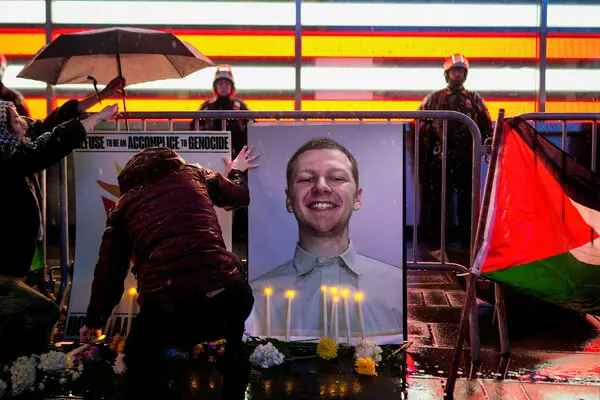On a somber Sunday afternoon outside the Israeli Embassy in Washington, D.C., tragedy unfolded as 25-year-old Air Force service member Aaron Bushnell committed a horrific act of self-immolation. As the flames engulfed him, he cried out “Free Palestine,” leaving behind a haunting scene that shook witnesses and observers alike. Bushnell succumbed to his injuries later that evening, leaving many questions unanswered and prompting reflections on the complexities of his life.
Bushnell’s background reveals a journey marked by both dedication to service and personal turmoil. Hailing from Whitman, Massachusetts, he joined the U.S. Air Force in May 2020, serving as a cyber-defense operations specialist with the 531st Intelligence Support Squadron at Lackland Air Force Base in San Antonio. His professional aspirations extended beyond the military, as evidenced by his desire to transition into software engineering, as indicated on his LinkedIn profile.
Raised in the Community of Jesus on Cape Cod, Bushnell’s upbringing was within a religious group that has faced allegations of abuse and strict social structures from former members. The transition from this environment to military service reflects a journey from one “high-control group” to another, as noted by acquaintances familiar with his background.
Despite his military commitments, Bushnell’s personal interests and beliefs revealed a multifaceted individual. Accounts from friends indicate his involvement in socialist events while stationed in San Antonio, alongside efforts to aid the homeless by distributing food. His objections to the military, particularly following the death of George Floyd, underscored a growing disillusionment with institutional structures.
In the days leading up to his fateful protest, Bushnell’s actions and communications hinted at a deeply troubled state of mind. Text messages to friends conveyed a sense of impending separation, while conversations revealed distress over events in Gaza and alleged U.S. military involvement. These revelations paint a picture of a man grappling with internal conflicts and seeking to reconcile his beliefs with his role in the military.
Bushnell’s final act, though shocking and tragic, raises important questions about mental health, ideological convictions, and the human toll of conflict. His protest, however misguided, serves as a poignant reminder of the complexities of individual lives and the deep-seated passions that can drive individuals to extreme actions.
As the investigation into Aaron Bushnell’s death continues, it is essential to approach the narrative with empathy and understanding, recognizing the layers of his identity beyond the headlines. In remembering him, we confront not only the circumstances of his death but also the broader societal issues that shaped his journey.
